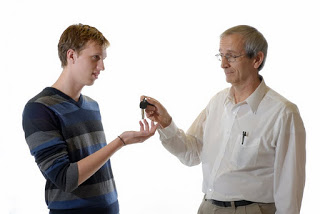Tag Archive: graduated.license

Graduated Drivers License Laws Around the United States
June 3, 2010
Young drivers in the United Stares are subject to many different laws, regulations and procedures. Many of the rules, regulations, privileges and limitations are similar from state to state but some also differ greatly. It would be overwhelming to compare the rules and regulations young drivers face in all 50 states. It’s easier to compare the policies of a handful of states. Many states differ on age young drivers can obtain their learner’s permits and driver’s licenses; they also differ on nighttime driving and passenger restrictions. Additionally the amount of supervised driving various from state to state and the length of time a young driver needs to have a learner’s permit before they can obtain a driver’s license various as well.
Minimum Age to Obtain a Leaner’s Permit
Many states allow teenagers to get their learner’s permits once they have turned 15. The minimum age to obtain a learner’s permit in Florida, Georgia and Texas is 15. In Colorado and Illinois 15 year olds can obtain their learner’s permits if they are enrolled in drives education. In California, teenagers must be 15 years and 6 months old before they can obtain their learner’s permits. Teenagers in New York are ineligible to obtain their permits until they turn 16.
Requirements to obtain a Driver’s License
After obtaining their learner’s permits young drivers are required to possess their permits for a specific amount of time until they are able to take their road tests (assuming they have reached the minimum age to take the toad test). In California, Texas and New York young drivers are only required to have a permit for six months before they take the road test for their driver’s licenses (or restricted licenses). In Illinois a permit is required for nine months before the road test can be taken. Colorado, Florida and Georgia require young drivers to keep their permits of a minimum of 12 months.
Before young drivers are able to get their licenses they are required to log a specific be amount of time behind the wheel. Most states require that 50 hours of driving time be completed and that 10 or 15 of those hours include nighttime driving. However, Texas only requires that 20 hours of driving being completed. But, at least 10 out of the 20 hours needs to be nighttime driving. Georgia requires that drivers complete at least 40 hours of driving and that at least 6 of the hours are night time driving.
In order to obtain a driver’s license or restricted license most states require that driver’s be at least 16 and have taken driver’s education. In order to get a driver’s license without taking a driver’s education course most states require the drivers to be 17 or 18. New York State issues a junior license to 16 year olds who have held their permits for at least 6 months. If they take driver’s ed they are eligible for their senior licenses at 17, if not, they must wait until their 18. For 16 year olds in Florida, they can take the road test for their license when they turn 16 regardless if they have taken driver’s education.
Driver’s License Restrictions
Most states do not give newly licensed 16 year old boys and girl complete freedom behind the wheel. Most states have nighttime driving restrictions and many states have restrictions on the number of passengers young drivers can have in their vehicles. For example, 16 year old drivers in Florida are not permitted to drive between 11pm – 6 am and 17 year old drivers in Florida are not permitted to drive between 1 am – 5 am. Drivers in New York adhere to restrictions from 9 pm – 5 am. And drivers in Colorado and Texas adhere to nighttime driving restrictions from 12 am – 5 am.
Out of the seven states compared here, Florida is the only one that does not have a restriction in place for the number of passengers young drivers are allowed to have in their vehicles. In California, for the first 12 months young drivers are not allowed to have any non-immediate family passengers under the age of 20 in their vehicles. In Colorado and Georgia, drivers are restricted to zero passengers for the first six months they have their license and no more than one for the second six months. In Texas, Illinois and New York young drivers are not allowed to have more than one passenger under the age of 21 in the vehicle. Again, immediate family members are an exception to the rule.

Ten Tips for New Drivers Before and After Getting Licensed
February 12, 2009
Tips for Before you Get Your Drivers License:
1. Learn the material in your driver handbook, not just so you can pass the test, but so you can carry the information into your driving behavior.
2. Memorize the graduated licensing laws in your state. Not only must you follow them, but you shouldn’t ride with anyone who isn’t following them.
3. Talk to your parents about their expectations and the rules you’ll have to follow to use the family car or get your own vehicle. The time to refine the rules is now, before you have your license.
4. Encourage your parents to let you practice driving in unfamiliar areas, at night, when it’s raining, and on expressways, not just on familiar streets close to home during daylight.
5. Learn to scan the driving scene ahead so you can anticipate problems and react in time. Ninety percent of driving decisions are based on what you see.
Tips for After you Get Your Drivers License:
6. Sign a driving contract with your parents, specifying driving rules and curfews. Incorporate your state’s graduated licensing laws into the contract. The contract should include an agreement for your parents to pick you up, no questions asked until the next day, should you be unable to drive or ride with someone else for any reason.
7. Ask your parents to let you continue practice-driving occasionally; every new driver can use the extra training.
8. Minimize distractions in your vehicle. Keep the radio volume low, put your cell phone away, and ask passengers to minimize conversation. Wear your safety belt and make sure all your passengers wear theirs.
9. NEVER use driving as a stress-reliever. Drivers who do this often speed or get distracted. Learn to manage stress in healthy ways – by taking a walk, taking a nap, talking to a friend, or volunteering.
10. Read the warning labels on any medicines, including over-the-counter (those that don’t require a prescription); many medications cause sleepiness or dizziness and shouldn’t be taken while driving. Read our most recent post on Teen Drivers and Prescription Drugs.
And of course, NEVER drink and drive.
